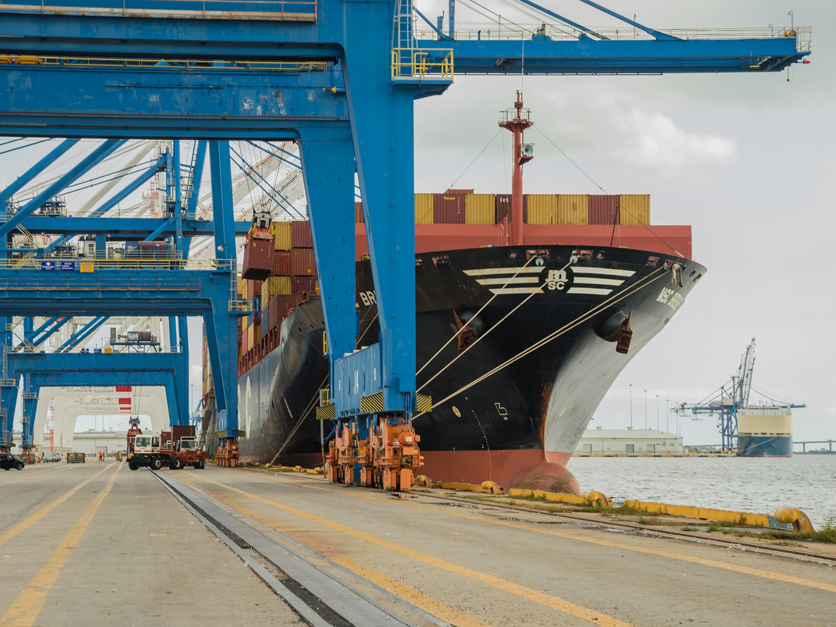When the coronavirus first swept through China, many ports effectively ceased to function as workers stayed home. Now, fears are rising about similar disruptions in the U.S. as the illness spreads.
The Department of Homeland Security has deemed port employees and government inspectors needed to approve ag commodities for export as “essential critical infrastructure workers,” but they are still human and vulnerable to infection. It’s a vulnerability that became obvious last week in Texas.
Test results came back to show that a Port of Houston dock worker had contracted the coronavirus and the port was quick to shut down two container terminals that handle beef, pork, seafood, fruits, vegetables, processed food, beer, wine and other beverages that are leaving and coming to the U.S.
The terminals were only shut for about a day and a half, but it was enough to spark concern that other terminals in the Port of Houston and in ports across the country could be shut down just as quickly in response to coronavirus infections that are multiplying rapidly.
“We certainly are concerned,” said Steve Mercer, a spokesman for the U.S. Wheat Associates. “Obviously, we never know what’s going to happen. The best we can do is monitor.”
The Port of Houston also keeps agricultural commodities such as wheat, cotton and dairy flowing to customers around the world, but so do other ports and groups like USW are staying in contact with them to make sure exports continue to flow.
Mike Klein, a spokesman for the USA Rice Federation, said California members reacted to the news from Texas by expressing alarm that the same thing could happen in the Port of West Sacramento, where producers were filling large orders for importers in Japan and South Korea.

Steve Mercer, U.S. Wheat Associates
Matthew Clark, the terminal manager for the Port of West Sacramento, told Agri-Pulse “the port will stay open and service all scheduled vessel calls until directed otherwise by the authorities.”
Likewise, John Akre, the marine terminal manager for the Port of Portland, which sends millions of tons of wheat worldwide every year, said shipments are running smoothly as special sanitation and other procedures are being put in place to avoid spreading the coronavirus.
The Port of New Orleans issued a statement Monday to say, “During this unprecedented crisis, the port and our maritime partners are proud to continue to do our part as a vital link in the global supply chain so essential goods continue to reach our communities.”
Still, many in the U.S. ag sector are looking for federal leadership in how the threat of infection is being handled.
“The question is how can these ports manage something that happens related to COVID-19 and continue to keep the flow of products going out or coming in, and not disrupt the supply chain that’s already on edge,” said Robert Guenther, senior vice president for public policy at the United Fresh Produce Association. “Our recommendation is that ports get together and create a protocol … to figure out how we are going to triage this if something happens. This was a one-person case. What if it was three or four or five people? How does that impact the flow of products?”
Interested in more coverage and insights? Receive a free month of Agri-Pulse or Agri-Pulse West by clicking here.
And even the situation at the Port of Houston could have been much worse with just the single infection, said Guenther. Faced with the potential for an extended shutdown, United Fresh, other ag groups, retail companies and even USDA Undersecretary Greg Ibach convened quickly and started engaging with port officials.
Ibach was not available for immediate comment, but the undersecretary has been instrumental in USDA’s outreach to assure exporters and importers that the supply chain will hold.
Stevedores are still working the docks, federal grain inspectors are still grading shipments, USDA meat inspectors are still approving product and ag commodities are still departing in bulk and containers to customers around the world, but importers and exporters alike are seeking reassurances.
Last week, ag commodity buyers in Japan and Taiwan began reaching out to their U.S. suppliers for reassurance that international deliveries would continue. Producers here say they are doing their best to provide, according to industry sources who asked not to be named.
“We’ve had customers ask us about it and we’ve given them all the reasons we think the (products are) still going to be able to go,” said one industry source.
It’s not just the ports. In the case of meat, inspectors for USDA’s Food Safety and Inspection Service must be present in the plants that process the beef, pork and poultry. In the case of grain, all importers depend on the availability of officials from the Federal Grain Inspection Service to perform grading on the crops before they are loaded on to ships.
The ability of human inspectors, whether in FSIS or FGIS, to stay healthy and perform the critical duties is another potential weakness, but the agencies have been reaching out to exporters with assurances that even if inspectors become unavailable.
“In this time of much uncertainty, we know that many of you have questions about how the department will continue to ensure that grading and inspection personnel are available,” said Ibach and USDA Undersecretary for Food Safety Mindy Brashears in a joint statement last week. “It is more important than ever that we assure the American public that government and industry will take all steps necessary to ensure continued access to safe and wholesome USDA-inspected products.”
The Agricultural Marketing Service’s FGIS went a step further Tuesday, assuring farmers and exporters that its inspectors will be issued latex gloves, masks, hand sanitizer and they will “be equipped with credentials authorizing them as essential personnel.”
Furthermore, if inspectors get sick, other USDA officials can pitch in to help.
“If needed, AMS is prepared to remedy any possible disruptions in services,” the agency said. “For example, FGIS may enlist employees from other parts of the agency … to assist with providing services. If these measures cannot be taken, FGIS will inform customers of alternative options.”
For more news, go to www.Agri-Pulse.com.


